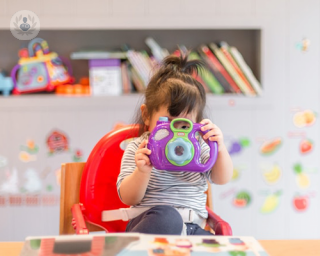Child health surveillance
Dr Sunit Godambe - Paediatrics
Created on: 09-09-2019
Updated on: 03-21-2023
Edited by: Aoife Maguire
What is child health surveillance?
When a child is sick, parents know to take them to their doctor, but paediatrician visits are just as important for healthy children as they grow and develop. Regular check-ups are important for all children to keep track of their physical, emotional, and social development.
Child health surveillance is the concept that children should have scheduled and regular paediatrician visits to screen and assess them for any underlying health condition from infancy through adolescence. This is to prevent disease and detect physical and developmental abnormalities from an early age. The American Academy of Paediatrics calls these visits well-child visits.

Why would a child need health surveillance?
Prevention: children receive all necessary immunisations against childhood viruses and illness, preventing them from becoming ill. Parents can also avail of nutritional advice and safety tips for children at home and at school, to avoid injuries and malnutrition.
Growth and development can be tracked: parents can track their child’s growth from one visit to the next and any developmental problems, behavioural problems, or learning problems can be detected from an early stage.
Concerns can be raised: regular visits to a paediatrician allow parents to ask questions about their child and raise any concerns they might have about their behaviour, sleeping and eating patterns, or communication skills.
Team approach: regular visits create a bond between the parent, child, and paediatrician. It helps children to develop optimal mental, physical, and social health.
Preparing for a well-child visit
1. Make notes about anything you’ve noticed about your child’s health and development, including any behavioural changes.
2. Make a list of questions for the doctor and encourage your child to ask questions about their own health, too. The Well-Visit Planner can help you to identify what questions you want to bring up.
3. Gather information for your doctor to take to the visit with you, such as school reports to help your doctor have a better picture of your child.
What does a well-child visit involve?
A well-child visit is a chance for you to get regular updates about your child’s health and development.
The health care team will conduct a physical examination, measure height and weight, update immunisations (see recommended immunisation schedules) and allow you, as a parent or care provider, to ask any questions you may have regarding your child’s health. If your child is a teenager, they will have one-on-one time with the doctor.
The visit involves:
- Detecting whether your child has any health concerns or underlying illnesses
- Offering ways to prevent your child from developing health problems
- Providing support for your child’s emotional, physical, and social well-being
- Giving you the opportunity to ask questions and learn from healthcare advice
You can ask questions and talk about your child’s growth, everyday life, challenges they face, family life, school performance, and even your proudest moments.
To help you before your next visit, take notes during the visit to remind yourself of what you’ve learned and what can be improved. That can be your to-do list and have your health care team go over it with you.
After a well-child visit
Depending on your child’s age, they may require visits every few weeks, months, or every year. See the AAP Schedule of Well-Child Visits here. Make sure to take note of any significant changes or developments in your child’s health and daily life to have for your next visit.
If you have questions before your next visit, your team of health care professionals will be on hand by telephone if you need them.






